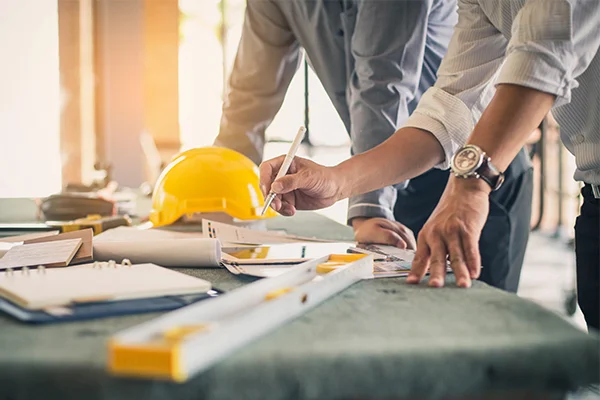The design, installation, and maintenance of machinery and equipment are the primary uses of mechanical engineering in industrial settings. Many essential elements of mechanical engineering for industrial applications are listed below:
Design: To build machinery and equipment that is dependable, functional, and economical, mechanical engineers are needed, whereby they create systems that can resist harsh industrial settings and function dependably for extended periods of time using their knowledge of mechanics, thermodynamics, and materials science.
Installation: In order to install and test the equipment after it has been created, mechanical engineers collaborate with other experts including electrical engineers and technicians. This entails ensuring that the equipment is functionally sound, that it complies with safety and regulatory standards, and that it performs as intended.
Maintenance: Maintenance of the gear and equipment that mechanical maintenance engineers develop and install is another duty, which includes creating maintenance plans, carrying out routine checks, and resolving issues as they emerge. Moreover, mechanical engineers strive to increase equipment longevity, decrease downtime, and improve performance.
Mechanical engineers in industrial settings may be involved in quality control, project management, and research and development in addition to their core duties. The design, installation, and maintenance of machinery and equipment utilised in industrial settings are heavily influenced by mechanical engineering.
The Role of Mechanical Engineering
Industrial applications
As it covers the design, production, and maintenance of machinery and equipment utilised in industrial settings, mechanical engineering plays a crucial role in industrial applications. Following are some specific instances of how mechanical engineering is used in industry:
Design
Mechanical engineers create machinery and equipment that can carry out specific tasks, survive difficult industrial settings, and function dependably for lengthy periods of time using their knowledge of mechanics, thermodynamics, and materials science.
Manufacturing
The manufacture of machinery and equipment is supervised by mechanical engineers, who make sure that it is done so in accordance with tight guidelines and all applicable regulations.
Installation
Mechanical engineers oversee the installation of machinery and equipment, ensuring it is done correctly and conforms with all safety and legal requirements.
Maintenance
Mechanical engineers develop maintenance schedules and procedures to ensure that machinery and equipment is properly maintained and inspected on a regular basis, and they diagnose and troubleshoot problems with machinery and equipment as they arise.
Safety and environmental considerations
The responsibility for ensuring that machinery and equipment is both environmentally responsible and safe for users falls on mechanical engineers. They make an effort to offer machinery and equipment that complies with the required safety and environmental laws.
Mechanical engineering, in general, plays a large role in industrial applications since it is involved in every phase of the life cycle of machinery and equipment, from design and manufacture through installation, maintenance, and safety. It is the responsibility of mechanical engineers to make sure that industrial machinery and equipment is dependable, effective, and safe for users.
Mechanical Engineering in Design
Given that it encompasses the construction and creation of mechanical systems, devices, and products, mechanical engineering plays a crucial part in design. to a given extent, mechanical engineering is used in design in the following ways:
Conceptualisation
Mechanical engineers use their understanding of materials, physics, and mechanics to conceptualise new products and systems. They work to develop needs and requirements, identify design roadblocks, and gauge viability.
Design engineering
3D models, technical drawings, and simulations are used by mechanical engineers to guarantee that intricate mechanical systems and products will operate as intended.
Prototyping
To test the usability, dependability, and safety of mechanical systems and products, mechanical engineers build prototypes.
Testing and validation
Mechanical engineers conduct tests and experiments to validate designs and ensure that they meet performance specifications and safety standards.
Design optimisation
Specialised mechanical engineers optimise their designs to save costs, increase output, and improve efficiency.
Overall, mechanical engineering is essential to the design process since it covers the creation and advancement of mechanical systems and products. To solve complex design challenges and guarantee that designs are practical, secure, and effective, mechanical engineers employ their knowledge of materials, physics, and mechanics.
Mechanical Engineering in Installation
Mechanical engineering plays a critical role in the installation of machinery and equipment in various industries, including manufacturing, construction, and energy. Here are some specific ways in which mechanical engineering is involved in installation:
Planning
Engineering Sydney‘s mechanical engineers play a vital role in the planning and scheduling of equipment installation. They work with project managers and other stakeholders to identify installation requirements, develop a plan, and establish timelines.
Equipment selection
Mechanical engineers aid in selecting the proper equipment for a particular installation project. They look at the equipment’s specifications, consider the intended application, and evaluate the operating circumstances to make sure it is appropriate for that use.
Installation supervision
Mechanical engineers oversee the installation procedure to make sure the machinery is set up properly and in accordance with the manufacturer’s instructions, and along with other artisans and contractors, they coordinate the installation procedure.
Testing and commissioning
It is the responsibility of mechanical engineers to test and commission machinery to guarantee its dependability and safety. They check that everything is installed properly and that the system is functioning as planned.
Safety considerations
Mechanical engineers prioritise safety during equipment installation, ensuring that all relevant safety regulations are followed, and that proper safety measures are in place to protect personnel and equipment during the installation process.
Because it encompasses planning, equipment selection, installation monitoring, testing and commissioning, and safety considerations, mechanical engineering is crucial for equipment installation. In order to ensure that equipment is placed properly, functions as intended, and complies with all applicable safety regulations, mechanical engineers are essential.
Ongoing Maintenance
For performing routine maintenance on machinery and equipment in many different industries, mechanical engineering is essential. The applications of mechanical engineering continuing in maintenance are demonstrated by the following:
Maintenance planning
Mechanical engineers play a vital role in maintenance planning, creating maintenance schedules and procedures to ensure that machinery and equipment is inspected, maintained, and repaired on a regular basis. They prioritise maintenance tasks based on equipment criticality and develop maintenance budgets.
Diagnostic and troubleshooting
Mechanical engineers diagnose and troubleshoot equipment problems, identifying the root cause of failures and developing solutions to prevent future problems.
Maintenance supervision
In order to ensure that maintenance duties are completed correctly and effectively, mechanical engineers monitor maintenance professionals and contractors. They supervise the maintenance workflow and offer advice on difficult maintenance jobs.
Preventive maintenance
Mechanical engineers develop preventive maintenance programmes to minimise unplanned downtime and reduce repair costs, and to identify possible issues before they become failures, they evaluate the machinery and establish maintenance schedules.
Equipment modification
Equipment can be modified by mechanical engineers to increase performance or lengthen life, whereby they review the technical specifications of the equipment, find adjustments that will enhance its functionality, and supervise their installation.
Mechanical engineering is essential in ongoing maintenance, as it involves maintenance planning, diagnostic and troubleshooting, maintenance supervision, preventive maintenance, and equipment modification. Mechanical engineers play a vital role in ensuring that equipment operates efficiently and safely, minimising downtime and repair costs, and optimising equipment performance and lifespan.


